Israeli Missile System Deployed In UAE Against Iranian Threats

Satellite images have shown the United Arab Emirates has deployed the Israeli-made Barak 8 missile aerial defense batteries against ballistic and cruise missiles, and drones.

Satellite images have shown the United Arab Emirates has deployed the Israeli-made Barak 8 missile aerial defense batteries against ballistic and cruise missiles, and drones.
Images released by Tactical Report, a geopolitical intelligence company covering events in the Persian Gulf states and Middle East, indicated that the batteries and an Elta EL/M-2084 radar have been deployed near al-Dhafra airbase, south of Abu Dhabi.
The Barak missile defense system is jointly developed by India’s Defense Research and Development Organization (DRDO) in collaboration with Israeli Aircraft Industry's Elta division, Rafael and several other companies in both countries.
The batteries are the first phase of a substantial contract for additional systems to protect sensitive sites that have been targeted by missiles and drones launched by Iran-backed Houthi rebels over Abu Dhabi’s cooperation with the Saudi-led military campaign. The UAE has seen several missile and drone attacks carried out by the rebels in recent months.
Late in September, Israel said it had agreed to sell the advanced air defense system to the UAE in the first such deal since they forged relations in 2020.The UAE and Israel have been coordinating appeals to the US to formulate a new security strategy for the Middle East in case of a nuclear deal with Iran.
The UAE has bought billions of dollars of advanced weapons from the United States, with one deal alone under the Trump administration put at $23.5 billion. US annual military aid to Israel is over $3.5 billion.
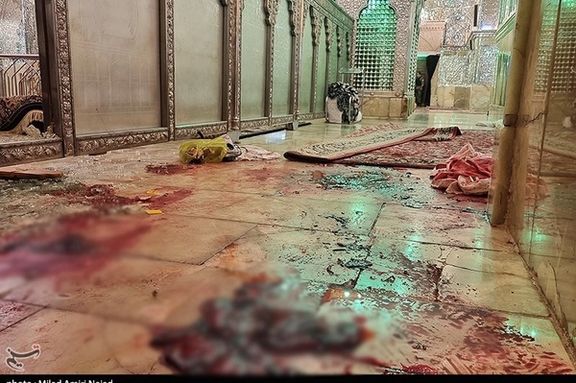
Iran's Revolutionary Guard (IRGC) says its intelligence wing (SAS) foiled a bomb attack Wednesday in Shiraz after a parallel deadly shooting at a shrine there.
"A bombing in Mo'ali Abad Street in Shiraz was detected and foiled by the Revolutionary Guards intelligence," Sepah news said, without giving further details.
There is no possibility to verify IRGC's claim, as the ideological-military-business organization and also Iran's Intelligence Ministry in the past have made numerous similar claims without presenting any evidence. In most cases no public trial of suspects were held or even names released.
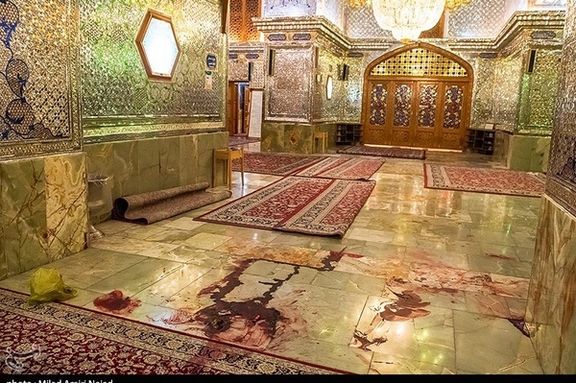
The IRGC-linked Fars News quoted “an informed security source in Shiraz” as saying that the remotely-controlled bomb was found and neutralized by security forces and intelligence ministry agents after the gun attack on Shahcheragh shrine.
Wednesday's shooting, which was claimed by the Islamic State (ISIS) group, killed 15 including children and injured dozens more at the Shahcheragh shrine. Officials said they had arrested a gunman who carried out the attack at the shrine. The attack took place amid widespread antigovernment protests across the country which began nearly two months ago following the death in police custody of Mahsa Amini, a 22-year-old Kurdish woman, on September 16.
The Iranian government has organized nationwide demonstrations against the shooting following Friday prayers. Funerals were also due to take place for the victims. Officials said they had arrested a gunman who carried out the attack at the shrine.
Supreme Leader Ali Khamenei vowed on Thursday to retaliate against those threatening the country's security without further elaboration as to whether this meant those responsible for the attack, protesters, or both.
"We will take revenge for the blood of the martyrs of Shiraz," said Tehran Friday prayer Imam Haj Ali Akbari about the attack on the shrine.
Many Iranians did not trust the authorities or believe that ISIS was responsible for the attack. They accuse the regime of being behind the attack or orchestrating it to blame protesters at home for causing unrest and insecurity and justify harsher crackdown against opponents.
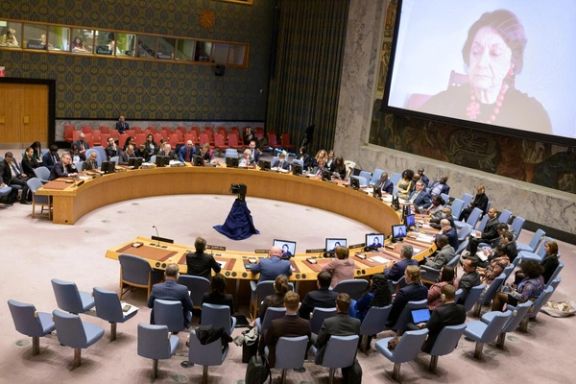
Iran’s alleged supply of drones to Moscow remains high on the agenda at the United Nations and in Israeli President Isaac Herzog’s visit to the United States.
Miguel de Serpa Soares, head of UN legal affairs, told the UN Security Council Wednesday that Secretary-General Antonio Guterres would “continue to prepare” reports on UNSC Resolution 2231.
France, the United Kingdom and the United States last week submitted a letter at the UN arguing any supply of drones by Iran to Russia would violate the resolution, which endorsed the 2015 Iran nuclear agreement. Russia’s UN ambassador Vassily Nebenzia said Wednesday the letter broke the UN Charter by seeking to influence the general secretary.
Antonio Guterres has reported twice a year, in June and December, on the implementation of Resolution 2231, including inspections of military parts found in Saudi Arabia and Yemen. Ukraine, France, the UK and US argue that the resolution contains a provision banning Iran from exporting without prior UN approval certain military goods, including drones.
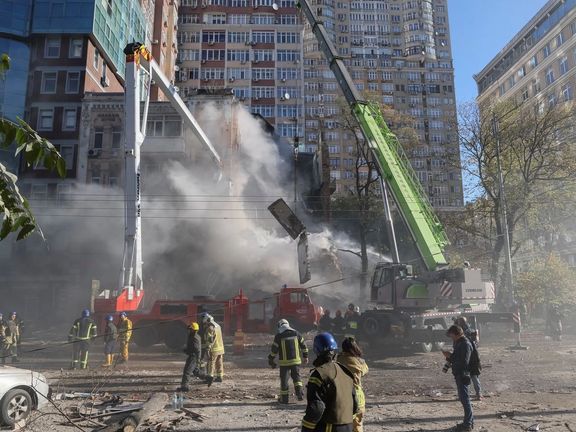
‘National security interests’
The alleged drone supply has also been highlighted this week in the US by Herzog, with Israel’s relations with Russia under the spotlight as Israel’s November 1 elections approach. Herzog pushed back Tuesday against Ukrainian demands from Ukraine for defense assistance, telling an event at the Atlantic Council “there are things we cannot supply due to national security interests.”
But while the Israeli government refuses to give military aid to Ukraine for fear of upsetting its relationship with Russia, the issue has lingered in Israeli politics since Diaspora Minister Nachman Shai tweeted October 16 in favor of sending support as there was “no longer any doubt where Israel should be in this bloody conflict.”
The Jerusalem Post Thursday hit back at Ukrainian President Volodymyr Zelenskyy over his latest broadside, pointing out in an editorial that Iran “developed drones because it can’t build advanced warplanes…[had] exported drones all around the Middle East and targeted Israel for years, and that Ukraine… [had] not backed Israel in the past…” The Post added that rockets used by Hamas and Hezbollah “sometimes…have origins in Russian technology.”
The newspaper argued it took years to deploy and integrate air defense systems and that “it’s not clear even” that Israeli defenses were “appropriate for Kyiv.” Zelenskyy had told Haaretz newspaper that an Iran-Russia “alliance…would not have happened if your politicians had made one decision at a time.” The Ukrainian leader said appeals to Israel went back to 2014, when Russia annexed Crimea.
‘Co-existence and weakening extremists’
Opposition leader Benjamin Netanyahu – who in 2019 adorned his Likud Party HQ with a huge picture of himself and Putin – told USA Today in an interview published October 21 that he hoped the Russian president would rethink “his vision of reconstituting a great Russian kingdom.”
Herzog’s meeting with President Joe Biden saw the US leader call for a ‘two-state solution’ in Israel-Palestine and welcome the maritime agreement due to be signed Thursday between Israel and Lebanon. The Times of Israel reported that US officials had raised concern over escalating violence in the West Bank, which has so far barely surfaced as an issue in the Israeli election.
A White House statement said the two leaders had “discussed the importance of promoting co-existence and weakening extremists who promote hatred and violence.” This year’s growing death toll in the West Bank has reportedly increased support there for Islamic Jihad, which has close links to Tehran.
Biden called the agreement with Lebanon “a historic breakthrough” that took “some real guts…and persistent diplomacy.” Hassan Nasrallah, leader of Tehran-allied Hezbollah, said in early October his party would respect the agreement, which could allow both countries to benefit from offshore gas deposits but which does not cover the land border.

Media in Iran report “a terrorist attack” in Shahcheragh shrine in Shiraz, capital of Fars Province that reportedly killed and injured several people Wednesday evening.
Tasnim and Fars news agencies affiliated with the Revolutionary Guard said that 10-13 people were killed and about 15 wounded, but the later government media raised the death toll to 15.
According to these reports three or four people opened fire inside the shrine and two were arrested.
Tasnim quoted a security source who said those responsible were "Takfiri, Wahhabi elements," referring to Sunni extremists.
Nationwide protests are raging in Iran on Wednesday to mark the 40th day of Mahsa Amini’s death, who was arrested by the ‘morality police’ in mid-September and died in police custody.
The information from government-controlled websites cannot be independently verified and the possibility of a false-flag operation to blame the protesters and “enemies” of the Islamic Republic exists.


Unknown gunmen shot dead two officers of Iran’s Revolutionary Guard (IRGC) in Zahedan, the provincial capital of the largely Sunni Muslim southeastern province of Sistan and Baluchestan.
An IRGC Colonel, identified as Mehdi Mollashahi, and Javad Keikha a member of the Salman Brigade, which belongs to IRGC's Basij paramilitary forces, were killed Tuesday when gunmen opened fire at them from a car and fled, the IRGC-affiliated Tasnim news reported.
The incident followed weeks of brutal crackdown by the IRGC and other Iranian security forces on protesters in Zahedan, who have joined the nationwide antigovernment protests triggered by the death in custody of 22-year-old woman Mahsa Amini.
Earlier in the week, the influential leader of Iranian Sunnis among the Baluch held Supreme Leader Ali Khamenei responsible for the September 30 massacre of Sunnis in Zahedan.
The intelligence chief of the IRGC in the province was also shot dead earlier in the provincial capital Zahedan. According to Tasnim, in addition to Colonel Mousavi, three other members of IRGC and its Basij paramilitary force were killed and 32 more injured in Zahedan clashes.
The attack by the IRGC on protesters, September 30, left more than 90 unarmed Baluch citizens dead as reported by human rights watchdogs in Iran and abroad. Sunnis in Iran comprising at least 10 percent of the population have had a rocky relationship with the Shiite clerical regime for four decades.
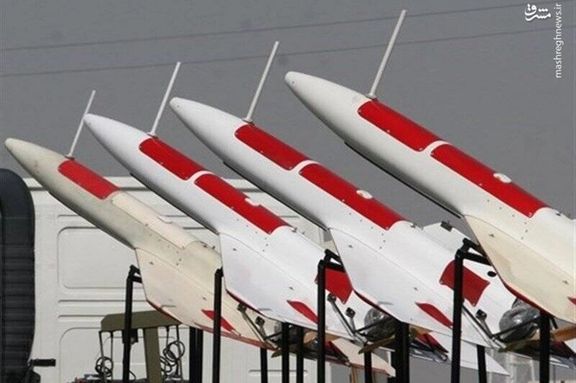
Ukrain’s President Volodymyr Zelensky says Tehran supports Moscow with drones in its invasion in exchange for getting assistance to develop its nuclear program.
Addressing the Haaretz Democracy Conference on Monday, Zelensky said that the Islamic Republic would have not been able to send equipment to Russia if Israel had not decided to stay neutral in the Ukraine war.
“In eight months of full-scale war, Russia has used almost 4,500 missiles against us. And their stock of missiles is dwindling. Therefore, Russia went looking for affordable weapons in other countries to continue its terror. It found them in Iran,” noted Zelensky.
The Ukrainian president further noted that “I have a question for you – how does Russia pay Iran for this, in your opinion? Is Iran just interested in money? Probably not money at all, but Russian assistance to the Iranian nuclear program. Probably, this is exactly the meaning of their alliance.”
Although Zelensky did not offer any evidence, Russia has built Iran’s sole nuclear power plant in Bushehr and has a contract to expand the plant with the addition of two new reactors at a cost of $10 billion.
Zelensky’s comments come as the Ukrainian Defense Ministry's Intelligence Directorate said Monday that Russia's mobilized soldiers are being provided with Iranian-made body armors and helmets, and new groups of “advisers” are also arriving in Russia to train them on the use of a new and more lethal type of drones, Arash UAVs.
Major General Kyrylo Budanov stated that “Russian forces have used most of their cruise missile arsenal and only have 13 percent of their pre-war Iskander, 43 percent of Kaliber, and 45 percent of Kh-101 and Kh-555 pre-war stockpiles left.”
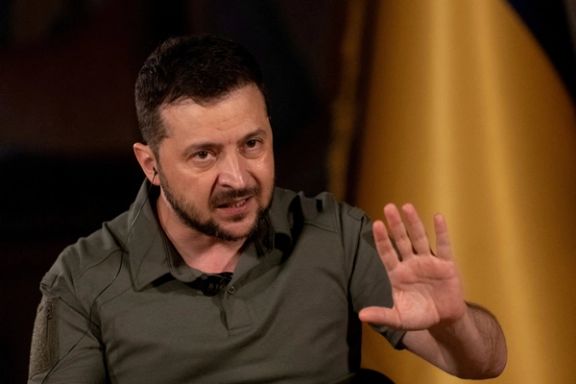
Budanov added that with the supply of cruise missiles dwindling Russian military relies on Iranian drones, but Tehran can send 300 drones per shipment as it takes a long time to manufacture the drones.
In remarks reported Monday, Iran’s foreign minister appeared to accept as possible, despite past denials, that Moscow had used Iranian drones in Ukraine.
“If it is proven to us that Iranian drones are being used in the Ukraine war against people, we should not remain indifferent,” Hossein Amir-Abdollahian said, as reported by Reuters.
The Iranian foreign ministry website and official news agencies last Friday reported Amir-Abdollahian denying claims at a European summit last week that Iran had supplied Russia with military drones deployed in the Ukraine war.
Last week, Ukrainian Foreign Minister Dmytro Kuleba officially asked for air defense systems and training from Israel’s Foreign Ministry in the face of attacks launched by Iranian Shahed drones. Yet, Israeli Defense Minister Benny Gantz stressed “that we are not selling weapons to Ukraine.”
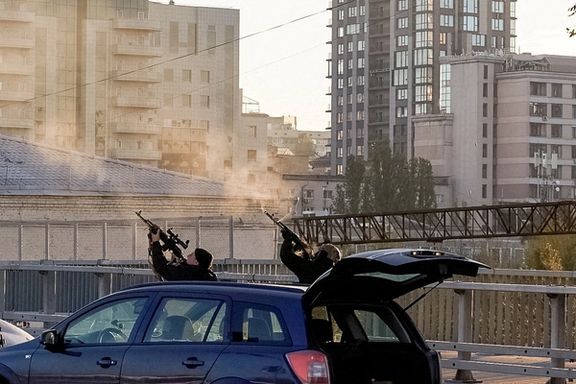
However, Israeli Prime Minister told Jerusalem Post on Sunday that Tel Aviv is increasingly concerned by the “dangerous closeness” between Moscow and Tehran over the supply of Iran-made drones to attack Ukraine.
Lapid said Israel is holding daily assessments to review its position on the conflict, adding that “It’s not something we are going to ignore or do nothing about… so what we need to do is reassess on a daily basis and react.”
Meanwhile, US House of Representatives Speaker Nancy Pelosi said on Monday that Iran was making the world less safe by supplying Russia with drones to be used against targets in Ukraine.
The US has been “trying for a while now to have a nuclear agreement with Iran so that we can make the world a safer place and now they're going off aiding the Russians and making the world a less safe place,” added Pelosi.
With the long suspension of negotiations to revive the 2015 nuclear agreement, Iran is now accused of involvement in the Ukraine war. On the other hand, Tehran’s crackdown on domestic protests is also drawing attention from the international community raising the possibility of more isolation and sanctions for Iran.
An Iranian daily on Tuesday said that the developments of the war in Ukraine are in an alarming way to the detriment of Iran.
Aftabnews warned the Iranian government that Russia’s invasion of Ukraine is an aggressive move to occupy an independent UN member state and the governments that support the aggressor will be considered violators of international law.
“It is said that the United States and three European countries have interpreted the provision of drones by Iran as a violation of UN Resolution 2231. If proved after investigations, it will justify and legitimize the activation of the snapback mechanism against Iran in the JCPOA agreement,” Aftabnews added.
If the snapback mechanism would be triggered, Iran will return to Chapter Seven of the UN Charter and all sanctions in place before the 2015 nuclear deal would be automatically reimposed on Iran.